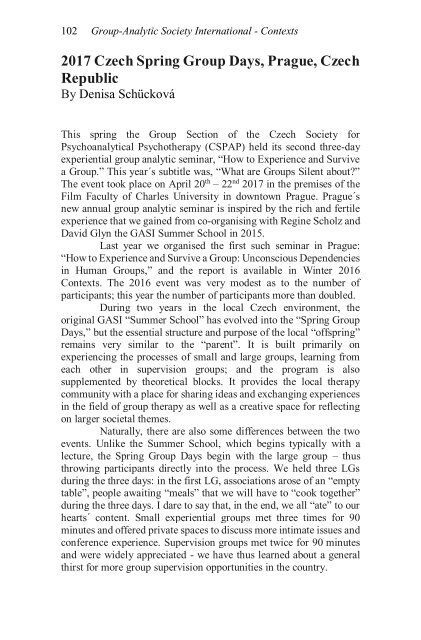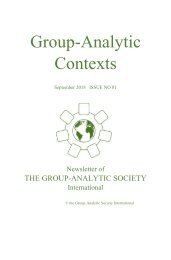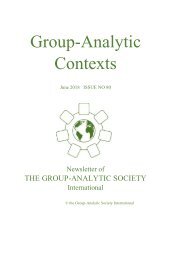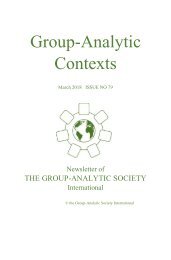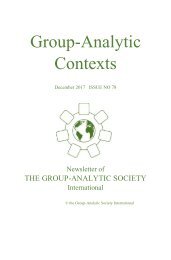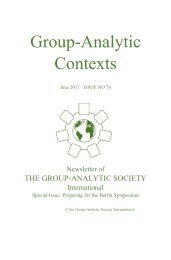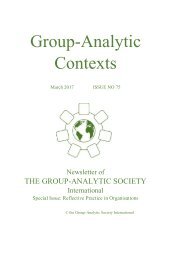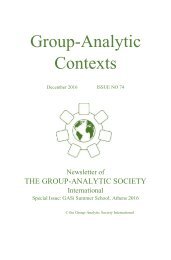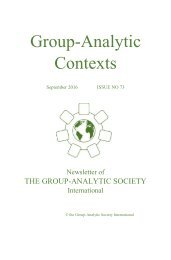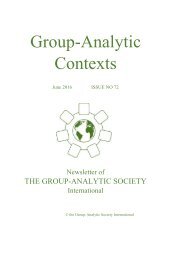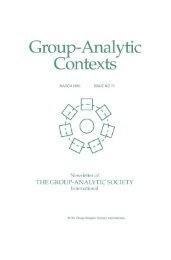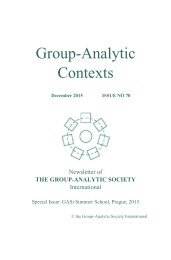Group Analytic Contexts, Issue 77, September 2017
Newsletter of the Group Analytic Society International
Newsletter of the Group Analytic Society International
Create successful ePaper yourself
Turn your PDF publications into a flip-book with our unique Google optimized e-Paper software.
102 <strong>Group</strong>-<strong>Analytic</strong> Society International - <strong>Contexts</strong><br />
<strong>2017</strong> Czech Spring <strong>Group</strong> Days, Prague, Czech<br />
Republic<br />
By Denisa Schücková<br />
This spring the <strong>Group</strong> Section of the Czech Society for<br />
Psychoanalytical Psychotherapy (CSPAP) held its second three-day<br />
experiential group analytic seminar, “How to Experience and Survive<br />
a <strong>Group</strong>.” This year´s subtitle was, “What are <strong>Group</strong>s Silent about?”<br />
The event took place on April 20 th – 22 nd <strong>2017</strong> in the premises of the<br />
Film Faculty of Charles University in downtown Prague. Prague´s<br />
new annual group analytic seminar is inspired by the rich and fertile<br />
experience that we gained from co-organising with Regine Scholz and<br />
David Glyn the GASI Summer School in 2015.<br />
Last year we organised the first such seminar in Prague:<br />
“How to Experience and Survive a <strong>Group</strong>: Unconscious Dependencies<br />
in Human <strong>Group</strong>s,” and the report is available in Winter 2016<br />
<strong>Contexts</strong>. The 2016 event was very modest as to the number of<br />
participants; this year the number of participants more than doubled.<br />
During two years in the local Czech environment, the<br />
original GASI “Summer School” has evolved into the “Spring <strong>Group</strong><br />
Days,” but the essential structure and purpose of the local “offspring”<br />
remains very similar to the “parent”. It is built primarily on<br />
experiencing the processes of small and large groups, learning from<br />
each other in supervision groups; and the program is also<br />
supplemented by theoretical blocks. It provides the local therapy<br />
community with a place for sharing ideas and exchanging experiences<br />
in the field of group therapy as well as a creative space for reflecting<br />
on larger societal themes.<br />
Naturally, there are also some differences between the two<br />
events. Unlike the Summer School, which begins typically with a<br />
lecture, the Spring <strong>Group</strong> Days begin with the large group – thus<br />
throwing participants directly into the process. We held three LGs<br />
during the three days: in the first LG, associations arose of an “empty<br />
table”, people awaiting “meals” that we will have to “cook together”<br />
during the three days. I dare to say that, in the end, we all “ate” to our<br />
hearts´ content. Small experiential groups met three times for 90<br />
minutes and offered private spaces to discuss more intimate issues and<br />
conference experience. Supervision groups met twice for 90 minutes<br />
and were widely appreciated - we have thus learned about a general<br />
thirst for more group supervision opportunities in the country.


